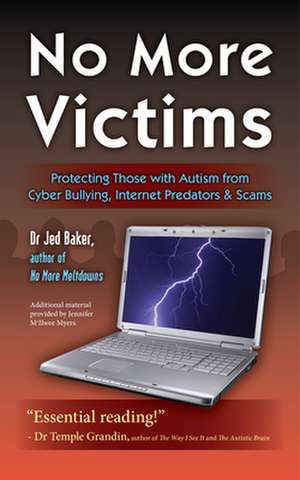No More Victims: Protecting Those with Autism from Cyber Bullying, Internet Predators & Scams
Autor Jed Bakeren Limba Engleză Paperback – 30 sep 2013
The digital world offers a wonderful way to communicate and socialize with others. Yet, it is also rife with the dangers of being victimized emotionally, physically, and financially.
Trusting individuals with autism spectrum disorders, who are oftentimes socially isolated, are especially vulnerable to online predators. Finally, we have a resource to help prepare them for the minefields they may encounter on the Internet.
In this much-needed book, Dr Baker presents three main areas of concern for our kids:
Trusting individuals with autism spectrum disorders, who are oftentimes socially isolated, are especially vulnerable to online predators. Finally, we have a resource to help prepare them for the minefields they may encounter on the Internet.
In this much-needed book, Dr Baker presents three main areas of concern for our kids:
- Cyber bullying
- Online sexual predators
- Internet scams
Preț: 85.34 lei
Nou
Puncte Express: 128
Preț estimativ în valută:
16.34€ • 16.80$ • 13.55£
16.34€ • 16.80$ • 13.55£
Carte tipărită la comandă
Livrare economică 19 februarie-05 martie
Preluare comenzi: 021 569.72.76
Specificații
ISBN-13: 9781935274926
ISBN-10: 1935274929
Pagini: 87
Dimensiuni: 130 x 202 x 7 mm
Greutate: 0.14 kg
Editura: FUTURE HORIZONS
ISBN-10: 1935274929
Pagini: 87
Dimensiuni: 130 x 202 x 7 mm
Greutate: 0.14 kg
Editura: FUTURE HORIZONS
Cuprins
Contents
Introduction
Types of Internet Victimization
How to Prevent Cyber Bullying
How to Protect Kids from Online Predators
Don’t Be a Victim of Internet Scams
Appendix A: “Be a Hero, Not a Bully” Contract
Appendix B: Use of Phone and Internet Contract
References
About the Author
Introduction
Types of Internet Victimization
How to Prevent Cyber Bullying
How to Protect Kids from Online Predators
Don’t Be a Victim of Internet Scams
Appendix A: “Be a Hero, Not a Bully” Contract
Appendix B: Use of Phone and Internet Contract
References
About the Author
Recenzii
“This book is essential reading for parents, teachers, and young adults to help prevent cyber abuse. Jed Baker gives good, practical advice!”
Dr Temple Grandin, author of The Way I See It and The Autistic Brain
Dr Temple Grandin, author of The Way I See It and The Autistic Brain
Notă biografică
Jed Baker, PhD, is the director of the Social Skills Training Project, an organization that serves individuals with autism and social communication problems. He is on the professional advisory board of Autism Today, the Asperger Autism Spectrum Education Network (ASPEN), Asperger’s Network Support for Well-being, Education, and Research (ANSWER), the YAI Autism Center, the Kelberman Center, and several other autism organizations. In addition, he writes, lectures, and provides training internationally on the topic of social skills training and managing challenging behaviors. He is an award-winning author of five books, including Social Skills Training for Children and Adolescents with Asperger Syndrome and Social-Communication Problems; Preparing for Life: The Complete Handbook for the Transition to Adulthood for Those with Autism and Asperger’s Syndrome; The Social Skills Picture Book; The Social Skills Picture Book for High School and Beyond; and No More Meltdowns: Positive Strategies for Managing and Preventing Out-of-Control Behavior. His work has also been featured on ABC World News, Nightline, Fox News, the CBS Early Show, and the Discovery Health Channel. Visit his Web site at www.jedbaker.com for more information.
Extras
Introduction
The digital world of cell phones and other Internet devices offers a wonderful way to communicate and socialize with others. Yet, it is also rife with dangers of being victimized emotionally, physically, and financially. In this book, I address three main areas of concern that pertain especially to individuals with autism spectrum disorders: cyber bullying, online sexual predators, and Internet scams.
Individuals on the autism spectrum may be particularly susceptible to these types of scams because of challenges with being able to gauge and understand others’ intentions, isolation, increased time online, and difficulty with developing assertive communication skills. It can be hard for them to determine when an online perpetrator may be bullying or trying to exploit someone, if they have difficulty with perspective taking and understanding other people’s motives and intent.
The social isolation individuals on the spectrum experience makes them more likely to spend time online and more apt to respond to online scammers and predators who offer friendship, romance, or other rewards. Finally, difficulty with communication skills may make it especially challenging to seek help or end communications with online perpetrators.


















